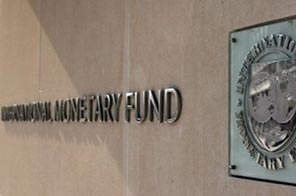IMF launches mission to debt-stricken Greece
ATHENS: A team of International Monetary Fund experts on Wednesday launched a week-long mission to debt-stricken Greece to advise the government on how to overcome its financial crisis, the finance ministry said.
"The mission has arrived and will start the day by meeting Finance Minister George Papaconstantinou," a ministry source told AFP.
"The team consists of five IMF officials who will spend a week here."
The visit came after a damning report from the European Union this week on Greece's economic statistics raised fears that the crisis could worsen.
The IMF said earlier it had been invited by Greek authorities to "explore possibilities for technical assistance from the IMF in the coming months on pension reform, tax policy, tax administration, and budget management."
"The mission is within the context of the regular surveillance that the IMF provides to its membership," it said.
Greek officials have repeatedly stressed that the country does not intend to apply for an IMF loan.
Recession-mired Greece has a public spending deficit that rose to 12.7 percent of output last year, far above the 3.0 percent ceiling permitted to countries sharing the euro currency.
It is also burdened by a debt constituting 113 percent of gross domestic product (GDP).
Prime Minister George Papandreou was expected to address Greece's economic woes at a new conference scheduled for later on Wednesday.
Across the continent, there is concern that serious fiscal problems in Greece and elsewhere threaten the credibility of the eurozone and could be a precursor to similar debt crises in other European economies.
The 16-nation eurozone's first recession has exacerbated fiscal weakness among its members, presenting the European Central Bank with the challenge of dealing with weaker economies such as Greece, Portugal and Spain.
The recently elected Greek Socialist government, which must present its crisis plans to the European Commission by late January, has said it will cut the deficit to 8.7 percent in 2010 by slashing spending and fighting tax fraud.
It aims to bring the deficit to below 3.0 percent of GDP in 2012.
European officials have criticised Athens for the failure to control its finances and the three main credit rating agencies have all downgraded the country's sovereign debt standing.
The European Commission this week published a damning report on Greece's "unreliable" economic figures, increasing the chances of the EU executive launching infringement proceedings against Athens.
The report highlights the general "lack of quality of the Greek fiscal statistics" and "failures of the relevant Greek institutions in a broad sense."
Commentator John Authers, writing in the Financial Times on Wednesday, said that the EU report was "a broadside that raised fears once more that Greece could default without being bailed out by fellow eurozone members."
The Athens stock exchange closed 5.0 percent down on Tuesday after the report was issued but was up 0.87 percent in morning trading on Wednesday.
A report by the European Central Bank in December said there was little chance of a eurozone member leaving or being forced out, but the fact the bank produced such a document at all raised eyebrows in financial markets.






